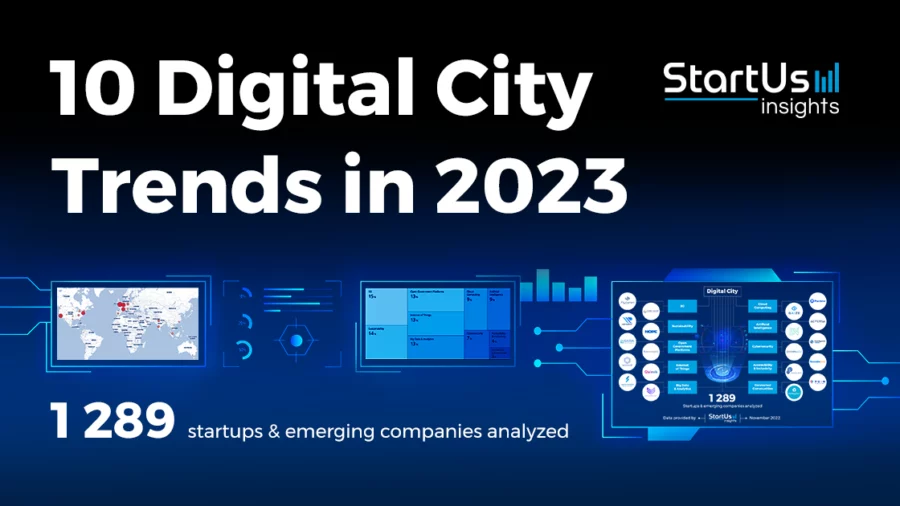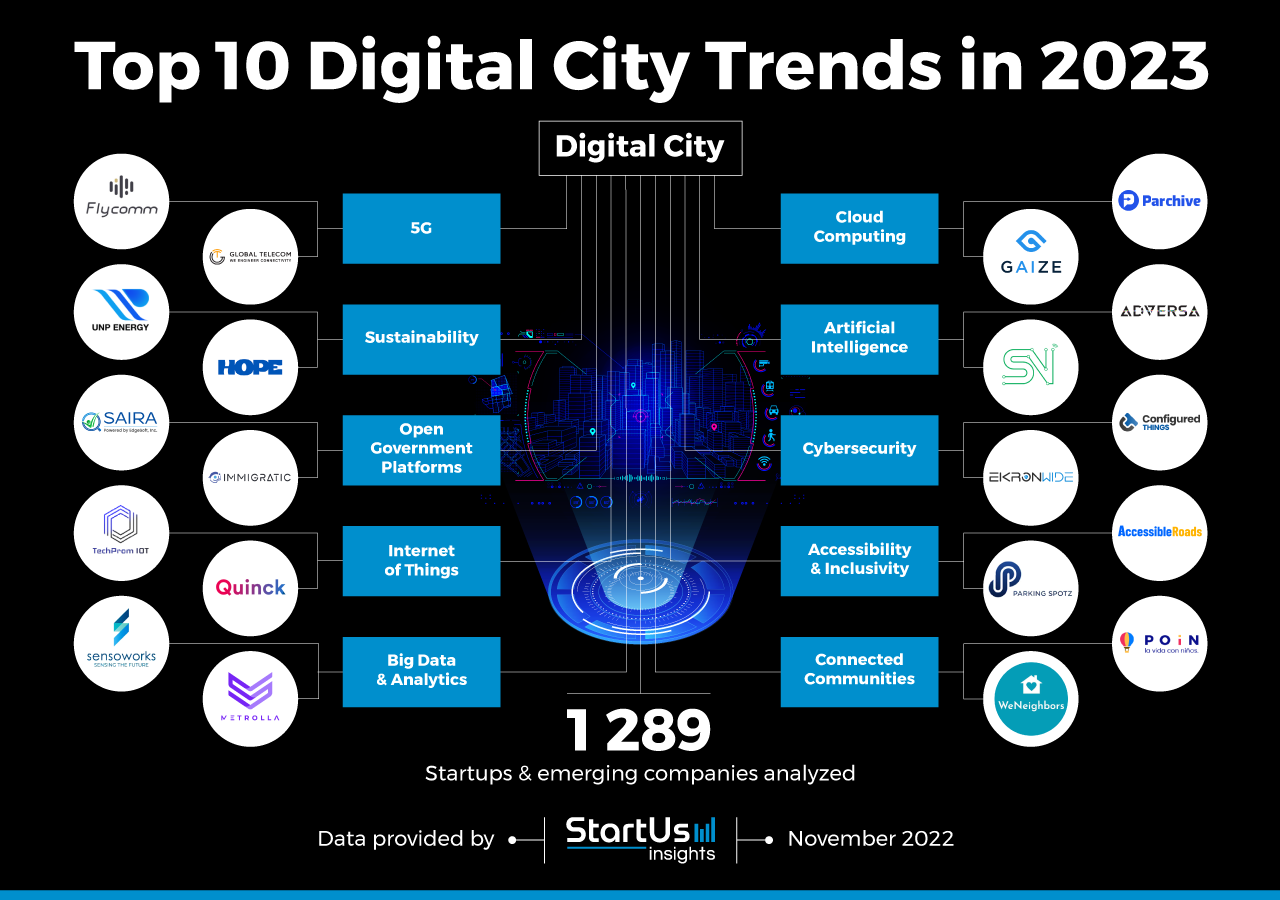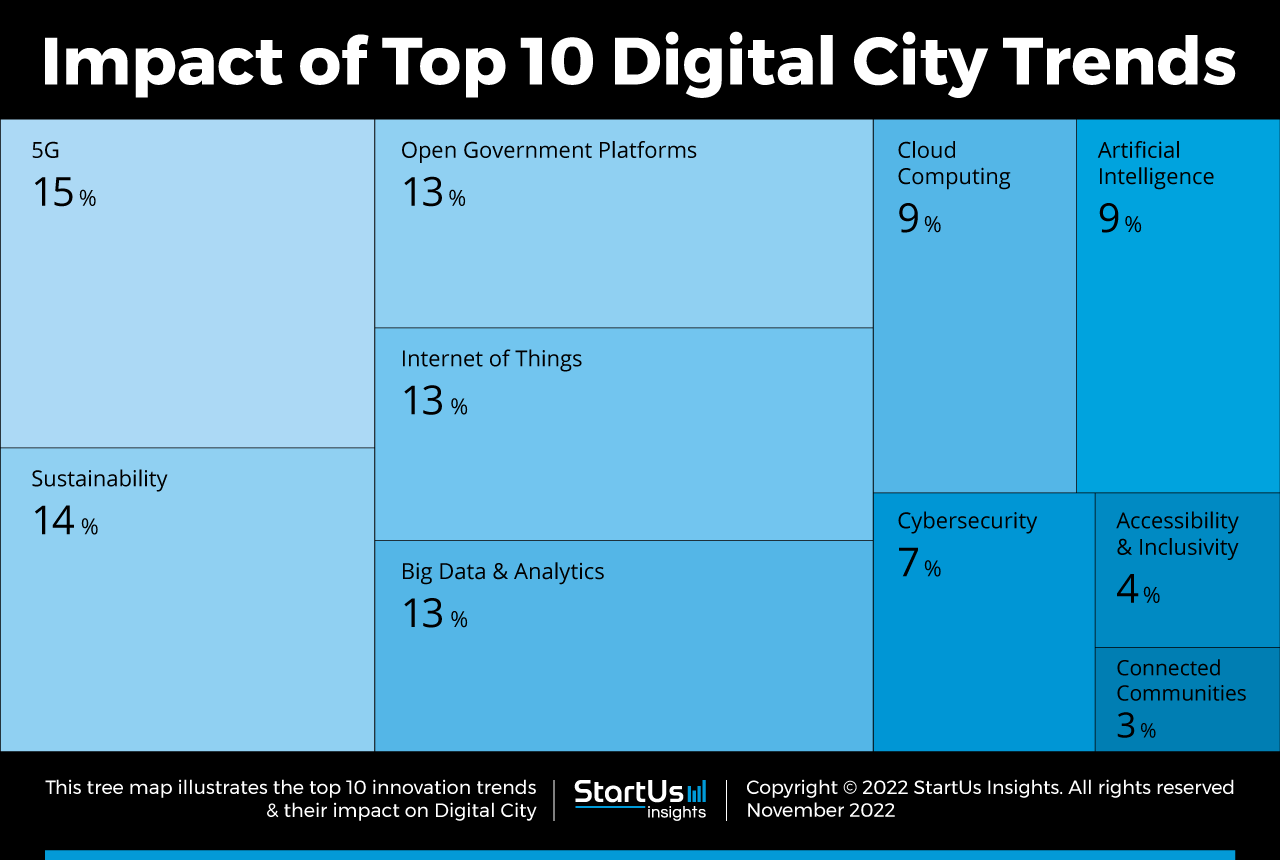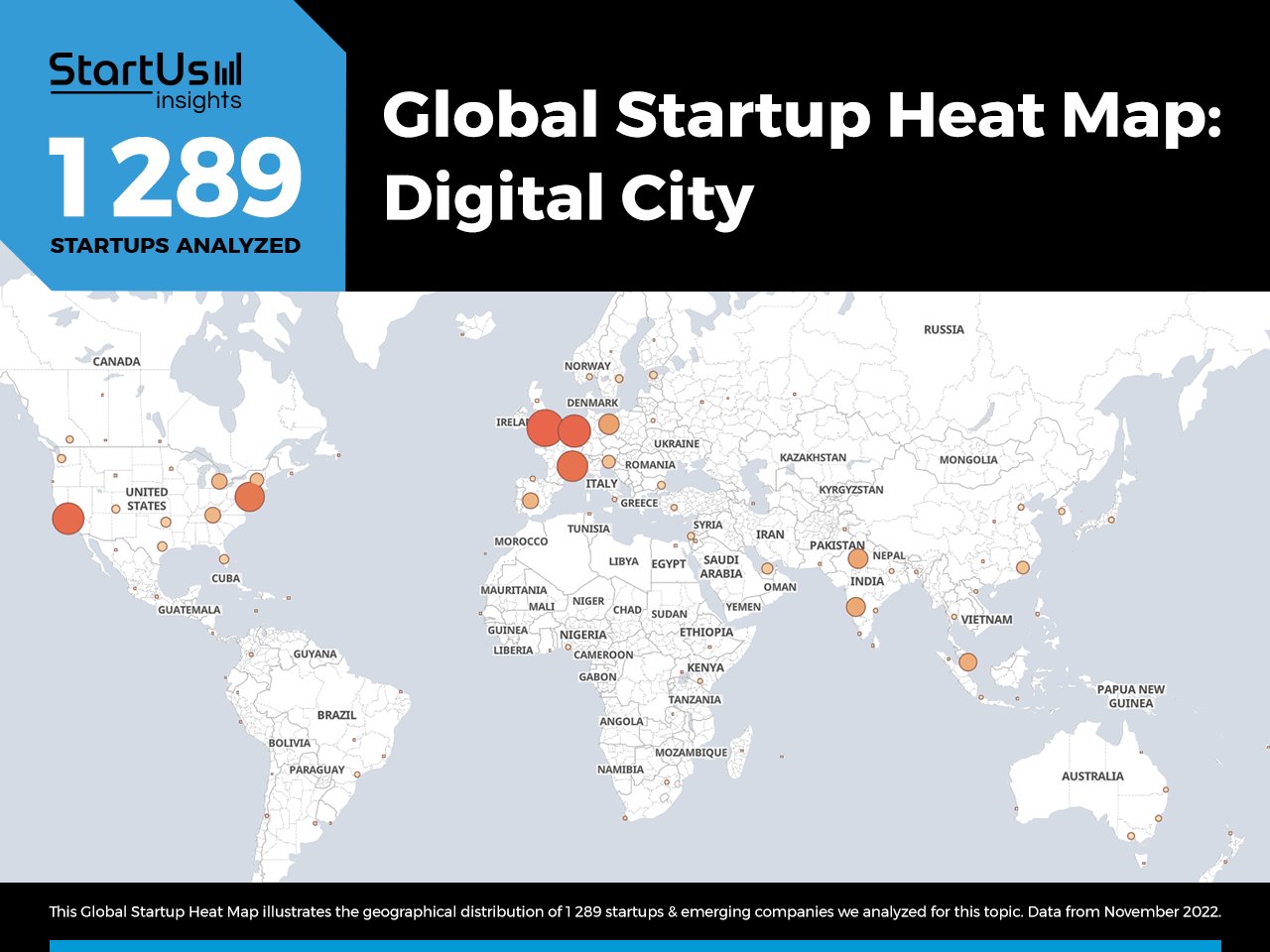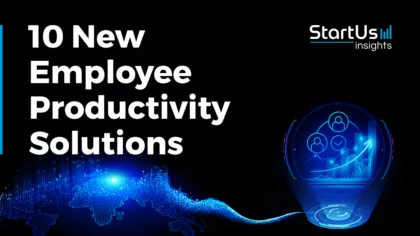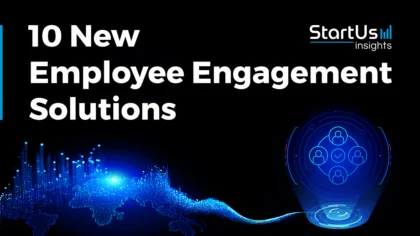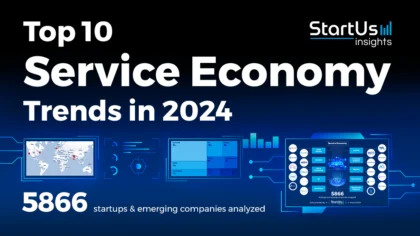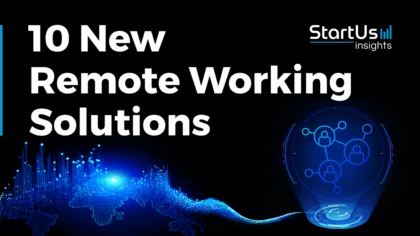Innovations in sensing devices and communication networks are enabling cities to digitize their infrastructure and services. Consequently, these solutions provide cities and citizens with live data on traffic, public services, and more. This report offers an overview of digital city trends and innovations in 2023 that improve city management. They range from 5G and open government platforms to artificial intelligence (AI) and connected communities. Read more to find out how these trends and innovations advance your business.
Innovation Map outlines the Top Digital City Trends & 20 Promising Startups
For this in-depth research on the Top Digital City Trends & Startups, we analyzed a sample of 1 289 global startups & scaleups. The result of this research is data-driven innovation intelligence that improves strategic decision-making by giving you an overview of emerging technologies & startups in smart cities. These insights are derived by working with our Big Data & Artificial Intelligence-powered StartUs Insights Discovery Platform, covering 2 500 000+ startups & scaleups globally. As the world’s largest resource for data on emerging companies, the SaaS platform enables you to identify relevant startups, emerging technologies & future industry trends quickly & exhaustively.
In the Innovation Map below, you get an overview of the Top 10 Digital City Trends & Innovations that impact companies worldwide. Moreover, the Digital City Innovation Map reveals 20 hand-picked startups, all working on emerging technologies that advance their field.
Top 10 Digital City Trends
Tree Map reveals the Impact of the Top Digital City Trends
Based on the Digital City Innovation Map, the Tree Map below illustrates the impact of the Top 10 Digital City Trends in 2023. Advances in the internet of things (IoT) and cloud computing allow cities to collect and provide information to citizens about a wide range of public services. Big data and analytics also utilize this large volume of data to generate insights. Further, open government platforms make the legislation more clear and transparent while promoting government-citizen collaboration. Additionally, artificial intelligence (AI) analyzes city data to identify risks, mitigate disasters, and more. Connected communities and accessibility & inclusivity platforms serve to improve living standards for cities. Lastly, sustainability solutions ensure optimum resource utilization in cities while cybersecurity platforms protect critical IT infrastructures from both internal and external vulnerabilities.
Global Startup Heat Map covers Digital City Startup & Scaleups
The Global Startup Heat Map below highlights the global distribution of the 1 289 exemplary startups & scaleups that we analyzed for this research. Created through the StartUs Insights Discovery Platform, the Heat Map reveals high startup activity in the USA and Europe.
Below, you get to meet 20 out of these 1 200+ promising startups & scaleups as well as the solutions they develop. These digital city startups are hand-picked based on criteria such as founding year, location, funding raised, & more. Depending on your specific needs, your top picks might look entirely different.
Top 10 Digital City Innovation Trends for 2022
1. 5G
The data from autonomous vehicles, mobile phones, environment sensors, traffic cameras, and more create bottlenecks with current networks. Such bottlenecks or latency in data transmission may prove fatal for city operations such as traffic and emergency management. 5G supports higher bandwidth, broader coverage, and lower latency for data transmission than 4G and other major connectivity technologies. Therefore, startups are creating 5G networking solutions for cities to accommodate the increasing amounts of connected devices and data transfer.
Flycomm aids 5G Infrastructure Planning
Flycomm is an Israeli startup that provides a cloud-based software platform to monitor, manage and plan 5G communication for smart cities. It collects data from various sources and uses big data analysis to measure network parameters using machine learning. Additionally, the platform features intuitive and optimal network planning with a wide range of applications, including public safety, tower, and REIT companies, smart cities, and cellular operators.
Global Telecom manufactures 5G Modules
Global Telecom is a US startup that creates telecommunication hardware, software, and AI solutions. The startup’s 5G module is an advanced multiband 5G NR/LTE-FDD/LTE-TDD/HSPA+ LGA device. It is capable of 3.4 Gbps over-the-air (OTA) data transmission with a wide area of network coverage. The module also supports different 5G gNB and 4G eNodeB systems. Global Telecom’s products thus enable high-speed data transfer for the range of IoT-based traffic, pollution, and infrastructure sensors in cities.
2. Sustainability
As cities rapidly expand and the population increases, poor waste management, air pollution, traffic congestion, resource scarcity, and more significantly affects the quality of life. Modern cities are thus implementing a range of smart sensors and platforms to better manage pollution, carbon footprint, and natural resources. Moreover, they enable cities to reduce congestion with intelligent traffic management as well as save water and electricity through connected meters and more.
UNP Energy provides Renewable Energy Powered Sensors
UNP Energy is a Taiwanese startup that specializes in sustainable energy solutions for IoT sensors and devices. Its Box UNP consists of a solar-embedded waterproof box (IP67) and an energy harvester printed circuit board (PCB). Their high-efficiency solar panels range from 0.1W to 150W and provide more daily power than traditional solar panels. Moreover, its BOX UNP is also compatible with various IoT sensors. This technology enables cities to integrate large-scale digital sensing systems in applications such as precision agriculture, livestock, air quality monitoring, and real-time wildfire alarms.
HOPE Hydration builds Smart Water Fountains
HOPE Hydration is a US startup that creates smart water fountains to reduce water bottle waste. The startup’s products, Model-Appia and Model-Benoi, allow users to fill their bottles with clean drinking water and also feature a water dashboard called Poseidon. The Poseidon dashboard provides building managers with real-time tracking of maintenance and the impact of water saving. This solution reduces waste in public spaces by encouraging people to use refillable water bottles over single-use plastic bottles.
3. Open Government Platforms
Governments receive increasingly larger budgets as cities grow. This also increases the chances of corruption and misuse of public funds. On the other hand, open government platforms promote accountability and traceability of government actions by providing the public with documents, proceedings, and records. They encourage citizen inclusivity in legislation and ensure that public policies reflect the interest of the population.
Saira offers a Public Record Search Engine
Saira is a US-based startup that offers citizens a search engine portal for local and state government public records and information. The AI-powered platform also scans and links multiple data sources across city departments to deliver transparent, real-time search results. This enables citizens to access information and public records more conveniently without in-person interactions.
Immigratic develops an Immigration Platform
Immigratic is a Canadian startup that creates an immigration platform. It is modeled with thousand of datasets from Canada’s open government data and provides a more accurate assessment quiz. Upon completing the quiz, the platform compares the user’s profile with thousands of similar cases and generates an assessment report. This way, intelligent, data-driven, and cost-effective immigration software reduces the time and effort of people in acquiring a visa.
4. Internet of Things
Currently, most cities exceed the population capacities of their initial designs. As a result, roads are often overcrowded, public transit experiences delays, and creates many more inconveniences for citizens. Cities are implementing connected sensors and devices in civic infrastructures such as traffic lights and public utilities to collect and analyze data. This data then powers smart traffic systems that improve traffic flow and give accurate public transit information. The data also provides residents with water and electricity consumption insights, allowing them to optimize resource consumption and costs. This is why startups are developing IoT-based solutions which improve the efficiency, sustainability, and livability of cities.
TechProm IoT makes Parking Lot Occupancy Sensors
TechProm IoT is an Indian startup that creates a wireless, on-ground fixed parking lot occupancy sensor. The startup’s IoT sensor, Spotbot, detects parked vehicles above it. The sensor also works in indoor, outdoor, and on-street parking. Besides, it provides data to LED display boards, parking guidance indicators, and mobile apps to enable smart parking. Moreover, SpotBot offers parking data insights to match the demand and supply of parking spaces across a city.
Quinck advances Smart Ticketing
Quinck is an Italian startup that develops IoT-based hardware and software solutions for smart cities. The startup’s smart ticketing solution automates ticket purchase and validation in public transport. It also facilitates user authentication through smartphones and electronic cards installed in vehicles, without the need for the user to make active gestures. While making travel more convenient, the solution also provides ticketing data for cities to perform user flow analytics.
5. Big Data & Analytics
Big data and analytics play an important function in digital cities as the myriad of sensors and their data provide valuable insights. Modern cities also face the increasing problem of resource scarcity which is compounded due to lack of resource planning and management. Besides this, as 5G increases data transmission capabilities so does the amount of data generated and collected by networks. To utilize this sensor data and gain actionable insights, startups are developing big data and analytics solutions. They find applications ranging from traffic management, infrastructure planning, building management, and more.
Sensoworks offers Infrastructure Analytics
Sensoworks is an Italian startup that creates end-to-end software solutions for intelligent infrastructure monitoring. The startup’s platform features analytics, reports, events, building information modeling (BIM), and geographic information systems (GIS) with continuous integrated monitoring. Additionally, it uses edge processing to predict anomalies and remotely implements commands. This enables real-time monitoring, control, and predictive maintenance of large city infrastructures.
Metrolla delivers Edge Data Access and Deployment Tools
Metrolla is a US-based startup that specializes in smart city sensor data analytics. The startup’s software-as-a-service (SaaS) traffic camera analytics platform features data collection, sensor management, measures changes, and more. Metrolla’s other product, LitEdge, provides a suite of tools to simplify data analytics and delivers useful information from cameras, radar, and LiDAR sensors. This provides city authorities with traffic analysis, accident detection, and much more through a plug-and-play solution.

6. Cloud Computing
The modernization of public infrastructure and services results in high capital and operating expenditure stemming from computing requirements. For cities to monitor and manage citizen information, utilities, etc. and securely store the data makes digitalization uneconomical for many developing countries. These problems are overcome through cloud computing which removes the need for on-premise hardware for management. Moreover, the scalability and flexibility of cloud computing make it an ideal solution for collecting, analyzing, and managing data from a wide range of sensor types across a city. This is why startups are using cloud computing to create solutions that enable cities to centralize, analyze, and securely store their data with minimal hardware or maintenance costs.
Parchive provides Cloud-based Parking Analytics
Nigerian startup Parchive develops a cloud-based parking analytics platform. It lets users manage and monitor on-street and off-street parking. The platform also offers remote data access, actionable insights through analytics, financial statement and reports, and more. It accepts parking reservations and delivers real-time notifications for parking operators and merchants. This allows cities to digitize their parking spots and alleviate the burden of finding parking spots in densely populated cities.
Gaize aids Impairment Detection
US-based startup Gaize specializes in devices that measure micro-movements of the eye. The startup’s objective impairment detection technology features a headset that tracks vertical gaze nystagmus, lack of smooth pursuit, and pupillary rebound dilation. This solution enables law enforcement agencies to make more accurate drug arrests. Moreover, the results from the tests are stored in encrypted and redundant cloud storage servers.
7. Artificial Intelligence
Smart cities generate an enormous amount of data and datatypes from the wide range of sensors integrated with infrastructure. Presently, there is a lack of high-speed data processing to be able to utilize this data effectively in real time. However, some of the factors that limit the implementation of AI include the unbiased use of AI, regulating interdependent infrastructures and data, and so on. Therefore, startups are developing AI-powered solutions that use big data with low latency and high bandwidth 5G networks. This enables real-time smart city applications such as disaster management, resource forecasting, water management, and more.
Adversa enables AI-driven Risk Management
Israeli startup Adversa offers AI-based risk management. The startup’s solutions let city authorities understand AI-based risks and adapt governance strategies, validate the integrity and identify vulnerabilities of their AI systems, and remediate cyber risks. Adversa’s smart city AI risk management solution secures all city cyber infrastructure from attacks while upholding the privacy of smart city data.
SenseNet offers AI-based Wildfire Detection
Canadian startup SenseNet creates an AI-based wildfire management platform to protect forest assets. It combines IoT sensors, mesh sensor networks, and AI for early wildfire detection and fire path prediction. Additionally, the platform displays common indicators for fire intensity and analysis for fire crisis management. Through this solution, cities are able to minimize the damage from wildfires and protect wildlife.
8. Cybersecurity
As cities digitize their services and integrate more smart sensors and devices, it leads to a rise in vulnerabilities for potential cyber-attacks. Cybersecurity solutions are crucial in protecting city digital ecosystems from the increasing threat of cyberattacks. Moreover, attacks on critical infrastructures cause harm to human life while breaches in government systems result in sensitive data leaks. This is why startups offer cybersecurity software that continuously monitors and secures digital city cyberspace.
Configured Things ensures Shared Cyberspace Security
UK-based startup Configured Things creates technologies that enable secure smart spaces for data sharing between cities, venues, buildings, and more. The startup’s platform provides a policy-based approach to connect organizations and centralize their systems and data. Configured Things also develops operating systems for securely shared systems and a solution that offers policy-bound sharing of streaming data. Their products enable organizations, cities, etc, to monitor, manage and control the cyberspace shared among multiple devices.
Ekron creates a Cybersecurity Platform
Israeli startup Ekron makes EKRONWIDE, a cybersecurity platform that provides cyber protection as well as monitors IT networks and edge devices. It offers a single-pane view of all city systems and features simple tools for managing system component information. Besides, the platform combines an asset management system, a cyber engine, and smart rules engine. This enables cities to monitor and manage a wide range of technology verticals from a single platform.
9. Accessibility & Inclusivity
Accessibility and inclusivity are important factors in determining the livability of a city. Most modern cities plan and expand while neglecting to account for people with disabilities. To be accessible and inclusive, cities need to ensure that digital public services and information are made available to all people regardless of their race, age, disabilities, etc. To enable this, startups create solutions to assist citizens in protecting housing rights, navigating surroundings, making parking reservations, and more.
Accessible Roads advances Live Street Navigation
German startup Accessible Roads creates interactive maps of accessible roads in a city. The map displays the location and accessible streets and nearby passages. Additionally, it allows users to navigate to multiple sites by creating the shortest possible accessibility routes. Accessible Road also offers cities an add-on to an existing application or website to aid residents, tourists, the disabled, and the elderly in navigation.
Parking Spotz aids Disability Parking Spot Reservation
Australian startup Parking Spotz develops a solution to manage parking with intelligent and real-time two-way data transmission. It navigates customers from start to end of the parking booking process, including navigational assistance. Managers are able to control parking space management to maximize occupancy and automate the customer parking journey. Moreover, the solution lets governments and smart cities to disabled and accessible parking bays more frequently, reducing parking anxieties.
10. Connected Communities
Communities are an important social aspect that was severely impacted by the COVID-19 pandemic due to social distancing and crowd restrictions. Modern communication technology enables communities to exist in many different forms such as virtual, ad-hoc, and individual or committee-driven. However, the prevalence of online meetings and interactions alleviated some of these social challenges. Moreover, as cities ease their social restrictions startups are creating platforms that promote communication within communities.
WeNeighbors creates a Community Engagement Platform
US-based startup WeNeighbors develops a software platform for private community engagement. It enables homeowner association (HOA) communities to improve neighborhood living by connecting and informing their communities about, safety, local events, and more. Many families are unable to engage with their communities due to work or responsibilities, disconnecting them from neighbors and community activities. WeNeighbors platform provides hyper-optimized community-centric engagement experiences without sacrificing privacy and security
POIN creates a Family Activity Search Platform
Spanish startup POIN creates a platform for users to find plans, places, and services around the city for entertainment activities. It uses AI algorithms and big data to map the city according to the age of each child. Besides, the startup’s AI, ANNA, interacts with users through their mobile phones to assist them in personalizing plans. Additionally, their POiN Points rating system uses criteria such as accessibility, cleanliness, hospitality, mobility, etc. which provides more reliability to the recommendations.
Discover all Digital City Trends, Technologies & Startups
The digital transformation of cities will continue to drive the integration of intelligent sensors in public infrastructures. AI and cloud computing also see increased adoption to analyze the vast amounts of data generated. Besides this, cybersecurity finds increasing importance as the digital ecosystem continuously expands, improving risk management.
The Digital City Trends & Startups outlined in this report only scratch the surface of trends that we identified during our data-driven innovation & startup scouting process. Among others, 5G and connected services as well as AI and data security will transform the sector as we know it today. Identifying new opportunities & emerging technologies to implement into your business goes a long way in gaining a competitive advantage. Get in touch to easily & exhaustively scout startups, technologies & trends that matter to you.
